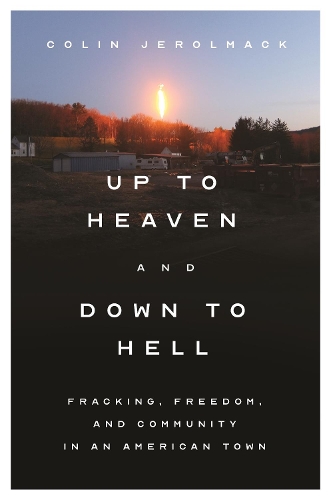
Up to Heaven and Down to Hell: Fracking, Freedom, and Community in an American Town
(Hardback)
Available Formats
Publishing Details
Up to Heaven and Down to Hell: Fracking, Freedom, and Community in an American Town
By (Author) Colin Jerolmack
Princeton University Press
Princeton University Press
29th June 2021
United States
Classifications
Tertiary Education
Non Fiction
Politics and government
Pollution and threats to the environment
Social impact of environmental issues
Conservation of the environment
338.27280974851
Physical Properties
Hardback
336
Width 155mm, Height 235mm
Description
A riveting portrait of a rural Pennsylvania town at the center of the fracking controversy Shale gas extraction-commonly known as fracking-is often portrayed as an energy revolution that will transform the American economy and geopolitics. But in greater Williamsport, Pennsylvania, fracking is personal. Up to Heaven and Down to Hell is a vivid and sometimes heartbreaking account of what happens when one of the most momentous decisions about the well-being of our communities and our planet-whether or not to extract shale gas and oil from the very land beneath our feet-is largely a private choice that millions of ordinary people make without the public's consent. The United States is the only country in the world where property rights commonly extend "up to heaven and down to hell," which means that landowners have the exclusive right to lease their subsurface mineral estates to petroleum companies. Colin Jerolmack spent eight months living with rural communities outside of Williamsport as they confronted the tension between property rights and the commonwealth. In this deeply intimate book, he reveals how the decision to lease brings financial rewards but can also cause irreparable harm to neighbors, to communal resources like air and water, and even to oneself. Up to Heaven and Down to Hell casts America's ideas about freedom and property rights in a troubling new light, revealing how your personal choices can undermine your neighbors' liberty, and how the exercise of individual rights can bring unintended environmental consequences for us all.
Reviews
"Finalist for the PROSE Award in Cultural Anthropology and Sociology, Association of American Publishers"
"Honorable Mention for the Allan Schnaiberg Award, Environmental Sociology Section of the American Sociological Association"
"[Colin] Jerolmacks many kitchen-table conversations with inhabitants of the formerly idyllic area of greater Williamsportor Billtown, as it is called, best known as the host of the Little League World Seriesreveal the tensions and trade-offs that follow from Americas liberty-loving ways."---Sarah Smarsh, The Atlantic
"The book considers fracking, property rights, and community in rural Pennsylvania. But at root, the book is a poignant consideration of what we choose to name as either 'mine' or 'ours.' Jerolmack considers how these two divergent (and often contradictory) classifications impact local governance, ecosystems, and the people who depend on them."---Gracy Olmstead, Commonweal
"[A] deeply reported study of the impact of fracking . . . [that] explores[s] the conflict between personal sovereignty and public good." * Publishers Weekly *
"With the sensitivity and patience of a veteran ethnographer, [Jerolmack]. . . spent years building relationships with a broad cross-section of locals in greater Williamsport. . . . Up to Heaven and Down to Hell is a work of empirical scholarship that strides confidently over the false boundary between ecological and social history."---Jonah Walters, Los Angeles Review of Books
"An immersive and absorbing account. . . . [Up to Heaven and Down to Hell] diagnose[s] the pathologies of tying environmental stewardship so intimately to the perquisites of private property. . . . What Jerolmack is able to trace, through masterful ethnographic storytelling, is the ambivalence, the tensions, and the unanticipated consequences of being empowered to dispense with ones own land."---Rebecca Elliott, Public Books
"Wide ranging and multilayered, with each layer presenting a slightly different perspective. . . . [Up to Heaven and Down to Hell] provides one of the most convincing accounts of the sources of current political and ideological divisions and extreme polarization that often seems inexplicable to the outside observer. . . . A valuable resource for students of the political economy of the energy industry, boomtown studies, environmental, political, rural and community sociology, and, of course, the ins and outs of fracking."---Ann R. Tickamyer, American Journal of Sociology
"A deeply empathetic ethnography. . . . The characters that drive the books narrative are complex and richly developed. Jerolmacks account of their motivations, their emotions, and rationalizations is compelling."---Fedor Dokshin, Social Forces
"An important story. . . . The sovereignty of landowners looms large in the fracking debate. Up to Heaven and Down to Hell suggests there is another competing ideal: government of the people by the people, and for the people."---Abraham Gutman, Los Angeles Review of Books
"Up to Heaven and Down to Hell is an excellent deep dive into the ways fracking mirrors the many problems we face as we try to change the way we think about energy, individual choice, and climate change."---Ed Meek, Arts Fuse
"Bravely written and rigorously documented."---Sheila Liming, Cleveland Review of Books
"Extremely well researched. . . a poignant and personal assessment."---M. S. Field, Choice
"While remaining very readable, [Up to Heaven and Down to Hell] provides important insights into US political polarization and includes interesting excursions into US history and social commentary. And it leads readers to ponder the relationship between politics, liberal economics and the environment. Most importantly, it provides valuable insights into the debates about global actions that might mitigate climate change and thus avoid a tragedy of the global commons that supports human life on earth."---Samuel Carmalt, Journal of World Energy Law & Business
Author Bio
Colin Jerolmack is professor of sociology and environmental studies at New York University and the author of The Global Pigeon. He lives in New York City. Twitter @jerolmack
